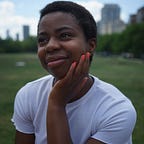Coming to Terms with My Bisexuality as a Black Woman
I distinctly remember my reaction to my mother signing a petition to ban gay marriage as a child. We were near 79th and Cottage Grove. Maybe going to church, catching the bus, or visiting one of her friends. At the time, I couldn’t articulate the dread and confusion that consumed me.
“Why did she care if these [gay] people got married?” my young brain questioned.
That was my earliest memory of homophobia, a term I now understand intimately. I recently came out to my mother and the experience went as well as you could expect from a Black, old-fashioned, Christian woman. Being an adult helped; instead of the visceral reaction I expected and a yelling match over the phone, she responded that I’m an adult and it’s my life. She doesn’t approve of my “lifestyle” but what is she to do at this point?
Unlike cutting my hair off, I gingerly eased my way into coming out of the closet. For all of my teen years, I didn’t even know I was queer. Every year in high school I had a crush on a female classmate. Every. Single. Year. I excused it away as them being the exception to the rule. Everyone is gay for Beyoncé, right? My amorous feelings for women were the same. Of course I have a crush on this person, she’s very kind.
My annual crush on a woman didn’t cease at my high school graduation. In college, I became tongue tied like a teenage boy for a tall, Black, curly afro track athlete. I have no idea how I mustered the courage to introduce myself, but I knew I could no longer repress the attraction I had for people of the same sex. You can only get heart eyes when spotting your female crush for so long before the truth outweighs the denial.
Facing the music of being queer is arduous. I repeatedly attempted to swallow these feelings. I attempted to swallow my sexuality. My identity. But what other choice did I have. I moved from a homophobic household to a two-year relationship with a male childhood friend. How do I tell my partner I’m queer without him feeling insecure? How do I explore feelings when my family often talked about kicking queer kids out or used homophobic slurs? How do I accept my bisexuality in this hostile environment?
I’m no stranger to being homeless. My mom has kicked me out of the house for less (more on that in another blog). Even if I had clarity on my sexuality as a teenager, I would’ve hidden it regardless. No need to give her more ammo.
The denial coupled with the fear of being homeless again caused an internal struggle. According to the Trevor Project, LGBTQ youth are 5.9 times more likely to report high levels of depression and represent 40% of the homeless youth population. I didn’t want to join these statistics anymore than I already had.
Around my freshman year of college, I put on a brave face and came out to my two best friends. Tell me why they knew already! Why didn’t they tell me?! They claimed that you can’t explain someone’s sexuality to them if they aren’t ready. I think they should’ve fessed up and saved me the headache of sifting through my feelings.
In 2017, I considered coming out fully. My best friends and partner knew; I was no contact with my mom; and I was in an open relationship so I could freely explore my feelings in a way I would’ve never been able to at home. All I had left to do was to tell the world I was bisexual.
Then Trump enacted a military ban for transgender people. Back into the closet I went. Trump’s presidency was four years of overt bigotry, xenophobia and hate against minorities. I couldn’t hide that I’m Black, I could hide that I’m queer.
I didn’t want another target on my back. The unjustified killings of Black people by the police, like George Floyd or Tony McDade, terrified me. A 2019 FBI Hate Crime Statistics report showed that 1,300 of 7,120 hate crimes reported, or 19 percent, stemmed from anti-LGBTQ bias. The Human Rights Campaign believes this report underrepresents hate crimes in 2019 because states aren’t mandated to report them to the FBI. Being a Black, queer woman wasn’t going to help my case and I wanted to minimize the hatred I could face in my daily life as much as possible.
I feared being the victim of a hate crime because someone knew I was a Black, queer woman.
Maybe I’m overexaggerating the danger. I do live in Chicago. Maybe I’m in one of the safest places I could be. Maybe I’m gaslighting myself.
If you haven’t guessed by now, this is my coming out story. I have been out of the closet for a month. I’m not shouting it from the rooftops, but I don’t hit “prefer not to say” when answering the sexuality question on demographic forms anymore.
I’m seeing a nonbinary person. I kissed a girl and I liked it. I embrace my bisexuality with open arms. My dating profiles are set to womxn and enbies. I’m diving into the queer community and making up for lost time. I have that freedom now.
If someone asks, I will respond without hesitating: I am queer. I am a Black, queer woman.
Enjoyed the blog? The Life By Tonyisha blogsite is in the works. Show your support by following her on Instagram or Pinterest at Life By Tonyisha, or liking the Life By Tonyisha Facebook page.
